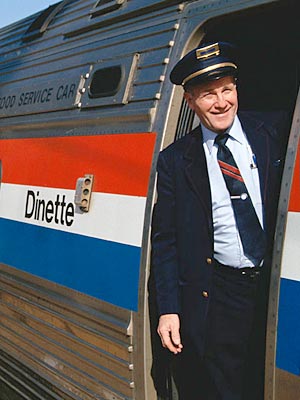To ensure that your journey from the train station to your destination is safe and reliable, a number of workers are involved — most important among them is the train conductor. The train conductor generally acts as a supervisor to the rest of the crew members working in train stations. The train conductor acts as a bridge between the public and the train crew.
Duties of a Train Conductor
Train conductors may work in train stations or on the train itself depending upon the demands of the employer. Their duty involves the handling of passenger and freight trains arriving and departing from their train stations. Some major duties of a train conductor involve the following.
- Verifying whether the train is safe to ride or not
- Checking whether the passengers are comfortable or not
- Collection of passenger tickets
- Making announcements at the station
- Ensuring that the train leaves on time by checking the schedules
Steps on how to Become a Train Conductor
Typically, the following are the steps involved in becoming a train conductor.
- Obtaining a high school diploma: A train conductor needs to have efficient communication skills. He has to possess good written and speaking skills. There is no room for serious mistakes and miscommunication, as the job deals with the safety of hundreds of people. In order to follow and communicate instructions, it’s essential that the train conductor has at least a basic education up to high school.
- Developing a good CV: A good CV is essential when applying for a train conductor position. He must have the experience in handling the needs of a lot people. A train conductor must handle the complaints of hundreds of customers. At the same time there is the duty of maintaining proper public relation of the employers.
- Work in the rail: Most rail services prefer experienced workers. Working in the railroad service is not a job that any newbie can just do. Sometimes the job is tedious. Perfection is expected to ensure the safety of passengers. At the same time, the job has more hazards than many others. To be able to bear the noise of running trains all day long and dealing with dirty machineries is the part of everyday job. So train conductors often rise through the ranks from below. So if you want to see yourself working as a train conductor in the future, it would be wise to start from below.
- Attending schools and trainings: The only shortcut to becoming a train conductor is through specialized education and training. There are specific colleges and schools that offer 2-year courses in railroad operations. Such courses teach students all the details about handling freight and passenger trains theoretically and practically. Some schools even offer intensive specialized courses for train conductors that can be completed in as low as 23 weeks. If you really want to develop a career as a train conductor, then pursuing the education and training requirements is the right path forward.
Average Pay of a Train Conductor
In general, a train conductor is paid anywhere between $20 to $35 an hour depending upon the location of work and experience. For a new conductor, the pay starts from $37,000 per year. For the more experienced, the pay can reach up to $80,000 annually. So the average salary hovers somewhere around $50,000 annually. The average age of train conductor in the US is 49 years, which indicates that it takes a long experience for train workers to climb up to the position of a train conductor.
Future Outlook
With automation and computerized technologies taking over the industry, the vacancies for new train conductors are decreasing. Some trains even operate without conductors these days. At the same time, hundreds of lower level employees are already waiting to fill in the positions left by retiring train conductors. Thus, if you are willing to become a train conductor today, you have to know that there is a lesser chance of being hired.


Be the first to comment on "Steps On How To Be A Train Conductor"